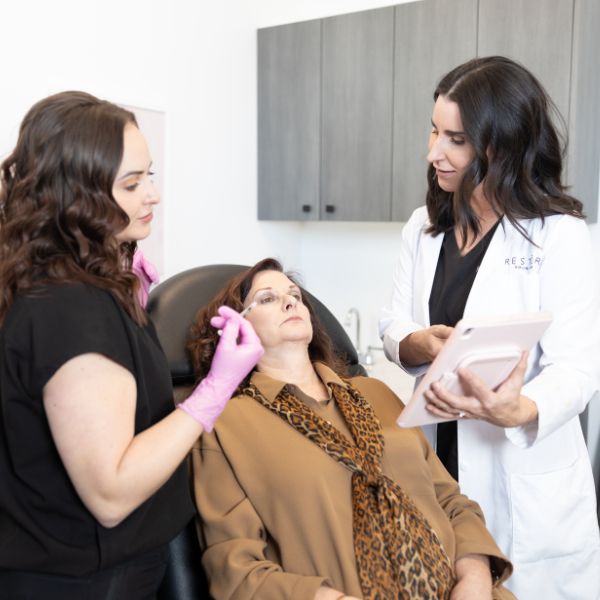
The Thrive Program
Hormone Replacement Therapy (HRT) and Nutrition Optimization
The Thrive Program consists of Hormone Replacement and Nutritional Optimization for both men and women - managed by our experienced medical providers. Hormone Replacement can be life changing for people struggling with the Menopause/Andropause transition – or for anyone seeking increased energy, improved mood, enhanced physical and mental performance, improved libido and overall vitality. See if you are eligible below!
About The Thrive Program

FDA Approved
Hormone Replacement Therapy (HRT) has been FDA approved since 1942 – with millions of people treated worldwide.

Professional Support
Our experienced medical professionals are with you every step of the way - monitoring your labs and dosing - with 24/7 support throughout the program.

Convenience
Medications are shipped directly to your home, with check-in appointments available in person and virtually.

Nutritional Support
As a part of your Thrive Program, we will assess your nutritional needs and build a comprehensive plan to optimize your supplements and vitamins

Enjoy Increased Vitality
Hormone Replacement Therapy (HRT) can improve energy, sleep, strength and endurance, well-being and libido.

Improved Health
Hormone Replacement Therapy will help you lose fat and gain muscle. This leads to significant long term health benefits - including reductions in heart disease, diabetes, osteoporosis and dementia.
What is Hormone Optimization?
From the day we are born, our hormones act as our body’s natural “instruction manual” – and optimal hormone levels allow us to feel and function our best. Hormones are the messengers of our Endocrine system – but aging and disease can cause them to decline. When this happens, we begin an accelerated aging process. As we lose that “instruction manual” we experience fatigue, weight gain, decrease in mental sharpness, and decreased sexual desire and enjoyment. The quality of our sleep declines and our strength and endurance are not what they were.
We may feel anxious, depressed, or irritable and “grouchy” all the time. When we are injured or sick it takes us longer to heal - and we begin to lose the ability to do the activities that we used to enjoy. (While these symptoms happen to everyone - women also experience the symptoms of menopause – such as hot flashes, loss of vaginal lubrication, irregular bleeding, and brain fog.)
Hormone replacement therapy allows you to feel and function your best by recreating the hormone levels your body produced when you were younger - which has been shown to not only prolong life but prolong the quality of one's life. Hormonal support is beneficial at any age, but the best long term protective benefits are achieved if hormones are replaced when you begin to lose them, usually in our 40's.
What Hormones do for us?
Estradiol and Progesterone are the two hormones that most people are referring to when they discuss “taking hormones” or hormone replacement therapy (also called HRT or ERT). To learn more about HRT for Women click here.
Testosterone is the hormone that most people are referring to when they discuss optimization for men – but men often need thyroid hormone and DHEA as well. To learn more about HRT for Men click here.

